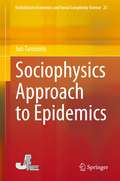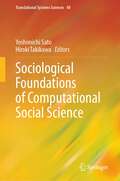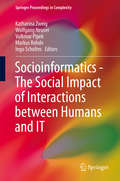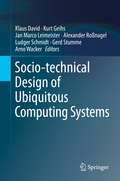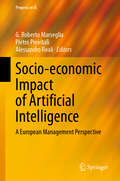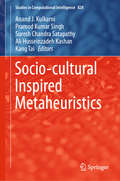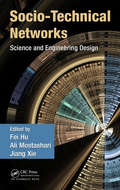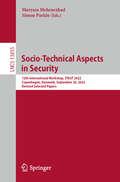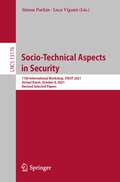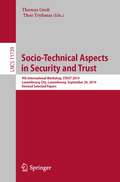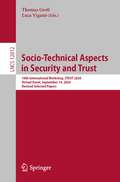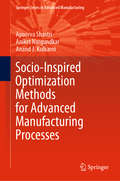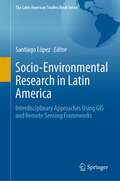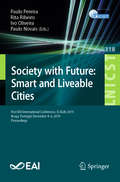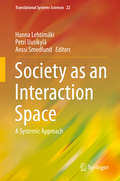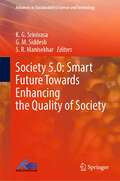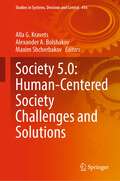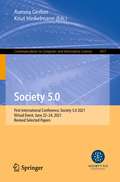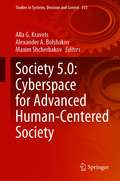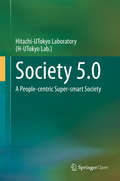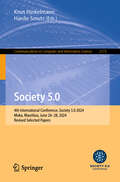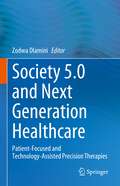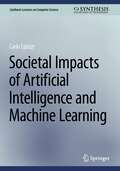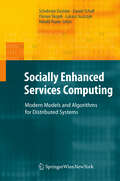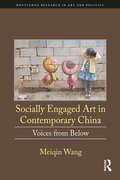- Table View
- List View
Sociophysics Approach to Epidemics (Evolutionary Economics and Social Complexity Science #23)
by Jun TanimotoThis book presents the fundamentals of evolutionary game theory and applies them to the analysis of epidemics, which is of paramount importance in the aftermath of the worldwide COVID-19 pandemic. The primary objective of this monograph is to deliver a powerful tool to model and analyze the spread of an infectious disease during a pandemic as well as the human decision dynamics. The book employs a variant of the “vaccination game,” in which a mathematical epidemiological model dovetails with evolutionary game theory. From a social physics standpoint, this book introduces an extended concept of the vaccination game starting from the fundamental issues and touching on the newest practical applications.The book first outlines the fundamental basis of evolutionary game theory, in which a two-player and two-strategy game, the so-called 2 × 2 game, and a multi-player game are concisely introduced, and the important issue of how social dilemmas are quantified is highlighted. Subsequently, the book discusses various recent applications of the extended concept of the vaccination game so as to quantitatively evaluate provisions other than vaccination, including practical intermediate protective measures such as mask-wearing, efficiency of quarantine compared with that of isolation policies for suppressing epidemics, efficiency of preemptive versus late vaccination, and optimal subsidy policies for vaccination.
Sociological Foundations of Computational Social Science (Translational Systems Sciences #40)
by Yoshimichi Sato Hiroki TakikawaThis book provides solid sociological foundations to computational social science (CSS). CSS is an emerging research field, and many books with those words in the title are on the market. However, CSS has not become mainstream in sociology, for which there are two reasons. First, CSS does not necessarily solve major research questions in sociology. Second, its sociological foundations are weak. These two reasons are interrelated—that is, CSS cannot solve major research questions because its sociological foundations are weak. Thus, even if it tries to solve those questions, its approaches seem to mainstream sociologists to miss the point. To resolve that shortcoming, this book fills the gap between CSS and sociology, shows that CSS can solve major research questions in sociology, and advances sociology by introducing to it theories and methodologies of CSS.
Socioinformatics - The Social Impact of Interactions between Humans and IT
by Katharina Zweig Wolfgang Neuser Volkmar Pipek Markus Rohde Ingo ScholtesSocioinformatics is a new scientific approach to study the interactions between humans and IT. These proceedings are a collection of the contributions during a workshop of the Gesellschaft für Informatik (GI). Researchers in this emerging field discuss the main aspects of interactions between IT and humans with respect to; social connections, social changes, acceptance of IT and the social conditions affecting this acceptance, effects of IT on humans and in response changes of IT, structures of the society and the influence of IT on these structures, changes of metaphysics influenced by IT and the social context of a knowledge society.
Socio-technical Design of Ubiquitous Computing Systems
by Alexander Roßnagel Gerd Stumme Jan Marco Leimeister Klaus David Kurt Geihs Ludger Schmidt Arno WackerBy using various data inputs, ubiquitous computing systems detect their current usage context, automatically adapt their services to the user's situational needs and interact with other services or resources in their environment on an ad-hoc basis. Designing such self-adaptive, context-aware knowledge processing systems is, in itself, a formidable challenge. This book presents core findings from the VENUS project at the Interdisciplinary Research Center for Information System Design (ITeG) at Kassel University, where researchers from different fields, such as computer science, information systems, human-computer interaction and law, together seek to find general principles and guidelines for the design of socially aware ubiquitous computing systems. To this end, system usability, user trust in the technology and adherence to privacy laws and regulations were treated as particularly important criteria in the context of socio-technical system design. During the project, a comprehensive blueprint for systematic, interdisciplinary software development was developed, covering the particular functional and non-functional design aspects of ubiquitous computing at the interface between technology and human beings. The organization of the book reflects the structure of the VENUS work program. After an introductory part I, part II provides the groundwork for VENUS by presenting foundational results from all four disciplines involved. Subsequently, part III focuses on methodological research funneling the development activities into a common framework. Part IV then covers the design of the demonstrators that were built in order to develop and evaluate the VENUS method. Finally, part V is dedicated to the evaluation phase to assess the user acceptance of the new approach and applications. The presented findings are especially important for researchers in computer science, information systems, and human-computer interaction, but also for everyone working on the acceptance of new technologies in society in general.
Socio-economic Impact of Artificial Intelligence: A European Management Perspective (Progress in IS)
by Pietro Previtali G. Roberto Marseglia Alessandro RealiThis edited volume discusses ethical issues raised by the use of artificial intelligence (AI) in business. Written by academics and practitioners across Europe, this volume provides a regional management perspective on the consequences of AI, including potential effects on the business models of companies, strategic considerations regarding the construction of data-literate companies and workforces, and the limits and opportunities of proposed EU regulations. Providing a forum to hypothesise solutions for accelerating technology adoption while guaranteeing human dignity, this book will be valuable for researchers and students interested in management, AI, fintech, information systems, and sustainable business as well as managers and practitioners navigating the challenges of a data-driven future.
Socio-cultural Inspired Metaheuristics (Studies in Computational Intelligence #828)
by Kang Tai Suresh Chandra Satapathy Anand J. Kulkarni Pramod Kumar Singh Ali Husseinzadeh KashanThis book presents the latest insights and developments in the field of socio-cultural inspired algorithms. Akin to evolutionary and swarm-based optimization algorithms, socio-cultural algorithms belong to the category of metaheuristics (problem-independent computational methods) and are inspired by natural and social tendencies observed in humans by which they learn from one another through social interactions. This book is an interesting read for engineers, scientists, and students studying/working in the optimization, evolutionary computation, artificial intelligence (AI) and computational intelligence fields.
Socio-Technical Networks: Science and Engineering Design
by Jiang Xie Fei Hu Ali MostashariWhile there are sporadic journal articles on socio-technical networks, there's long been a need for an integrated resource that addresses concrete socio-technical network (STN) design issues from algorithmic and engineering perspectives. Filling this need, Socio-Technical Networks: Science and Engineering Design provides a complete introduction to
Socio-Technical Aspects in Security: 12th International Workshop, STAST 2022, Copenhagen, Denmark, September 29, 2022, Revised Selected Papers (Lecture Notes in Computer Science #13855)
by Simon Parkin Maryam MehrnezhadThis volume LNCS 13855 book constitutes the refereed proceedings of the 12th International Workshop on Socio-Technical Aspects in Security and Trust, STAST 2022, which held in Copenhagen, Denmark, during September 26, 2022. The 6 regular papers and 2 short papers were carefully reviewed and selected from 20 submissions for inclusion in the book. The workshop focused especially on the interplay of technical and human factors in achieving or breaking computer security, privacy, and trust, in both organizational and individual settings.
Socio-Technical Aspects in Security: 11th International Workshop, STAST 2021, Virtual Event, October 8, 2021, Revised Selected Papers (Lecture Notes in Computer Science #13176)
by Simon Parkin Luca ViganòThis book constitutes revised selected papers from the refereed conference proceedings of the 11th International Workshop on Socio-Technical Aspects in Security and Trust, STAST 2021, held in conjunction with ESORICS, the European Symposium on Research in Computer Security, as a virtual event, in October 2021. The 10 full papers included in this book were carefully reviewed and selected from 25 submissions. They were organized in topical sections as follows: web and apps; context and modelling; and from the present to the future.
Socio-Technical Aspects in Security and Trust: 9th International Workshop, STAST 2019, Luxembourg City, Luxembourg, September 26, 2019, Revised Selected Papers (Lecture Notes in Computer Science #11739)
by Theo Tryfonas Thomas GroßThe open access volume LNCS 11739 constitutes the proceedings of the 9th International Workshop on Socio-Technical Aspects in Security, STAST 2019, held in Luxembourg, in September 2019. The total of 9 full papers together with 1 short paper was carefully reviewed and selected from 28 submissions. The papers were organized in topical sections named as follows: Methods for Socio-Technical Systems focused on instruments, frameworks and re ections on research methodology and also System Security considered security analyses and attacks on security systems. Finally, Privacy Control incorporated works on privacy protection and control as well as human factors in relation to these topics.
Socio-Technical Aspects in Security and Trust: 10th International Workshop, STAST 2020, Virtual Event, September 14, 2020, Revised Selected Papers (Lecture Notes in Computer Science #12812)
by Luca Viganò Thomas GroßThis book constitutes the refereed post-conference proceedings of the 10th International Workshop on Socio-Technical Aspects in Security and Trust, STAST 2020, held as a virtual event, in September 2020. The 8 full papers and 3 short papers presented in this volume were carefully reviewed and selected from 42 submissions and are organized in the following topical sections: personality and behavior; behavior in face of adversaries; smart environments; decentralized systems and digital ledgers; and reflections on socio-technical aspects of security.The Chapter “Statistical Reliability of 10 Years of Cyber Security User Studies” is available open access under a Creative Commons Attribution 4.0 International License via link.springer.com.
Socio-Inspired Optimization Methods for Advanced Manufacturing Processes (Springer Series in Advanced Manufacturing)
by Anand J. Kulkarni Apoorva Shastri Aniket NargundkarThis book discusses comprehensively the advanced manufacturing processes, including illustrative examples of the processes, mathematical modeling, and the need to optimize associated parameter problems. In addition, it describes in detail the cohort intelligence methodology and its variants along with illustrations, to help readers gain a better understanding of the framework. The theoretical and statistical rigor is validated by comparing the solutions with evolutionary algorithms, simulation annealing, response surface methodology, the firefly algorithm, and experimental work. Lastly, the book critically reviews several socio-inspired optimization methods.
Socio-Environmental Research in Latin America: Interdisciplinary Approaches Using GIS and Remote Sensing Frameworks (The Latin American Studies Book Series)
by Santiago LópezThis contributed volume presents relevant examples of socio-environmental research that highlight the challenges and opportunities of using geotechnologies in interdisciplinary settings across the vast, culturally, and environmentally mega-diverse region known as Latin America. While remote sensing has been mostly used for mapping and monitoring physical features, geographic information systems open up opportunities for the integration of socio-economic and environmental data collected through individual and community-based surveys, in-situ measurements, and other participatory research techniques to offer additional analytically grounded power when evaluating socio-environmental processes that shape Latin American landscapes. The topics addressed in this book include deforestation and land degradation, borderlands dynamics, agriculture and agroecological systems, environmental conservation and development, public health, tourism, environmental justice, archeology, volunteered geography and urban planning, among others. The book is intended for academics, graduate and undergraduate classrooms, and general audiences with interest in Latin America and the socio-environmental issues that threaten the sustainability of the region and local communities. The book will also appeal to practitioners, managers, and policy makers interested in the application of geo-technologies and field-based research to address complex socio-environmental problems in the Global South.
Society with Future: First EAI International Conference, SC4Life 2019, Braga, Portugal, December 4-6, 2019, Proceedings (Lecture Notes of the Institute for Computer Sciences, Social Informatics and Telecommunications Engineering #318)
by Rita Ribeiro Paulo Novais Paulo Pereira Ivo OliveiraThis book constitutes the refereed post-conference proceedings of the First International Conference on Society with Future: Smart and Liveable Cities, SC4Life 2019, which took place in Braga, Portugal, in December 2019. The 13 revised full papers were carefully reviewed and selected from 19 submissions. The conference has brought researchers, developers, and practitioners who are leveraging and develoing new knowledge on the topic of smart cities, offering more efficiency to main infrastructures, utilities and services, creating a sustainable urban environment that improves the quality of life for its citizens and enhances economic development.
Society as an Interaction Space: A Systemic Approach (Translational Systems Sciences #22)
by Anssi Smedlund Hanna Lehtimäki Petri UusikyläAs digitalization and social media are increasingly blurring the boundaries between traditional societal, political, and economic institutions, this book provides a cross-disciplinary examination of value co-creation. From various standpoints, it examines how institutions contribute to service ecosystems and how digitalization is transforming value co-creation in these ecosystems. Further, the book shares new perspectives on relational dynamics among government, companies, and citizens. These insights fill the gaps between service science and political science by integrating institutional logics into the concept of value co-creation. The book subsequently examines society as an interaction space. Topics discussed include the new logic and transformation mechanisms of economic activities, citizen participation, governance, and policy-making in the face of technological innovations, market-based reforms, and the risk of disconnect between citizens and policy-making. Here the focus is on value co-creation in complex adaptive systems where institutions, individuals, and businesses negotiate value and interests in networked relations. In closing, the book presents a range of empirical case studies on value co-creation, which provide examples of active networked citizenship, innovative governance and policy-making, democratic leadership, and trust-building dialogue among institutions. The studies address the context of Nordic countries, recognized as world-leading democracies. Pursuing a systems approach, the book articulates a social reality composed of interacting and interconnected elements that cannot be captured with only micro or macro levels of analysis. Service ecosystems are considered as configurations of people and technologies embedded in institutionalized rules, cultural meanings, and practices, offering valuable insights into the service-centered view of markets and society. Given the breadth and depth of its coverage, the book offers a valuable resource for all students and scholars interested in understanding and envisioning the future democratic landscape.
Society 5.0: Smart Future Towards Enhancing the Quality of Society (Advances in Sustainability Science and Technology)
by K. G. Srinivasa G. M. Siddesh S. R. ManisekharThe book discusses Society 5.0 which fills the gap between cyber and physical space by providing a balanced environment between economic and social needs. The book is divided into two parts; part A focuses on various concepts related to Society 5.0 such as cyber space, physical space, information management and digital transformation. Part B discusses various integrated fields in Society 5.0, such as super-smart healthcare system, super-smart hospitality system, smart building, and transport management system. It also illustrates the concepts of big data, real-time analytics for smart Society 5.0 with an insight of real-time case studies.
Society 5.0: Human-Centered Society Challenges and Solutions (Studies in Systems, Decision and Control #416)
by Maxim Shcherbakov Alla G. Kravets Alexander A. BolshakovThis book focuses on open issues of Society 5.0, a new paradigm of a society that balances a human-centred approach and technologies based on cyber-physical systems and artificial intelligence. The book contains results of how intelligent or cyber-physical systems help to improve the quality of life in society despite new challenges. Discusses implemented breakthrough systems, models, programs, and methods that cover the following topics: biomedicine and healthcare, innovations in socio-economic systems, intelligent energetics, advances in transport systems, human-centric technologies. These approaches help to improve human society using cyber-physical systems in a dramatically changing environment. The target audience of the book are practitioners, enterprises representatives, scientists, PhD and Master students who perform scientific research on the application of cyber-physical systems towards Society 5.0.
Society 5.0: First International Conference, Society 5.0 2021, Virtual Event, June 22–24, 2021, Revised Selected Papers (Communications in Computer and Information Science #1477)
by Aurona Gerber Knut HinkelmannThis book constitutes revised and selected papers from the First International Conference on Society 5.0, Society 5.0 2021, held virtually in June 2021. The 12 full papers and 3 short papers presented in this volume were thoroughly reviewed and selected from the 54 qualified submissions. The papers discuss topics on application of the fourth industrial revolution innovations (e.g. Internet of Things, Big Data, Artificial intelligence, and the sharing economy) in healthcare, mobility, infrastructure, politics, government, economy and industry.
Society 5.0: Cyberspace for Advanced Human-Centered Society (Studies in Systems, Decision and Control #333)
by Maxim Shcherbakov Alla G. Kravets Alexander A. BolshakovThis book includes new findings on socio-economic cyber systems control and development approaches based on AI and data-driven techniques. The authors determine key social challenges and the main features of management and modeling processes. To enhance the efficiency of the socio-economic process, new approaches were suggested as well as its components based on the concept of Society 5.0. In this book, the authors substantiate the scientific, practical, and methodological approaches to the smart technologies’ development. The core is a human-centered concept of cyber systems as well as the intelligent paradigm. Approaches combined both mathematical models and data processing techniques are also proposed as advanced methods for smart system design for ecology and health care. The implementations of the developed prototypes, including testing in real domains, which have collected and analyzed big data and proved their effectiveness, are presented. The target audience of the book are practitioners, enterprise representatives, scientists, and Ph.D. and Master students who perform scientific research or applications of socio-economic cyber systems in different domains.
Society 5.0: A People-centric Super-smart Society
by Hitachi-UTokyo LaboratoryThis open access book introduces readers to the vision on future cities and urban lives in connection with “Society 5.0”, which was proposed in the 5th Basic Science and Technology Plan by Japan’s national government for a technology-based, human-centered society, emerging from the fourth industrial revolution. The respective chapters summarize the findings and suggestions of joint research projects conducted by H-UTokyo Lab. Through the research collaboration and discussion, this book explores the future urban lives under the concept of “Society 5.0”, characterized by the key phrases of data-driven society, knowledge-intensive society, and non-monetary society, and suggests the directionality to which the concept should aim as Japan’s technology-led national vision. Written by Hitachi’s researchers as well as academics from a wide range of fields, including engineering, economics, psychology and philosophy at The University of Tokyo, the book is a must read for members of the general public interested in urban planning, students, professionals and researchers in engineering and economics.
Society 5.0: 4th International Conference, Society 5.0 2024, Moka, Mauritius, June 26–28, 2024, Revised Selected Papers (Communications in Computer and Information Science #2173)
by Hanlie Smuts Knut HinkelmannThis book constitutes of the revised selected papers from the 4th International Conference on Society 5.0, Society 5.0 2024, held in Moka, Mauritius, during June 26-28, 2024. The 29 full papers presented in this book were thoroughly reviewed and selected from a total of 76 qualified submissions. These papers discuss the various challenges and opportunities for a Society 5.0 in different areas, including Business Information Systems, Innovation and Entrepreneurship, Diversity, Innovation in the Digital Age, Healthcare and Care Systems, Information Security, Mobility, Human-System Interaction Scenarios, Fintech & International Collaborations.
Society 5.0 and Next Generation Healthcare: Patient-Focused and Technology-Assisted Precision Therapies
by Zodwa DlaminiThis book analyses the ability of technological advancements to represent, enhance, and empower multidisciplinarity in the context of Society 5.0. and next generation medicine. New technologies allow patients to communicate with medical personnel anytime, anywhere and shape the terrain of healthcare ecosystem at an unprecedented rate. Five main trends become apparent in this process: Hybrid care models combining virtual and in-person services, digitization of healthcare specialties, increased Artificial intelligence (AI) adoption, health systems moving to the cloud and advanced precision medicine.In its chapters the book dissects the important roles for technologies in areas such as digital twinning, big data, Internet of Things, AI, cyber-physical systems, blockchain technology to lead the healthcare digitalization envisioned in Society 5.0. Throughout the book the authors discuss how to incorporate these new technologies legally, ethically, safely, and securely and in keeping with the highest standards of human rights. It also advocates for the need for careful oversight and mindful allocation of resources and energy for sustainable development.This book, written by experts in the field from academia and industry, will appeal to researchers, healthcare professionals, policy makers, teachers and students interested in the ways healthcare is reorganized based on digital transformation efforts and the rethinking of care, including technologies.
Societal Impacts of Artificial Intelligence and Machine Learning (Synthesis Lectures on Computer Science)
by Carlo LipizziThis book goes beyond the current hype of expectations generated by the news on artificial intelligence and machine learning by analyzing realistic expectations for society, its limitations, and possible future scenarios for the use of this technology in our current society. Artificial Intelligence is one of the top topics today and is inflating expectations beyond what the technology can do in the foreseeable future. The future cannot be predicted, but the future of some elements of our society, such as technology, can be estimated. This book merges the modeling of human reasoning with the power of AI technology allowing readers to make more informed decisions about their personal or financial decisions or just being more educated on current technologies. This book presents a model that sketches potential future scenarios based on a discussion of the expectations today, the analysis of the current gap in the literature, and a view of possible futures in terms of technology and use cases. Specifically, this book merges literature on the technology aspects, the sociological impacts, and philosophical aspects.
Socially Enhanced Services Computing
by Daniel Schall Schahram Dustdar Florian Skopik Lukasz Juszczyk Harald PsaierSocially enhanced Services Computing deals with a novel and exciting new field at the intersection between Social Computing, Service-oriented Computing, Crowd Computing, and Cloud Computing. The present work presents a collection of selected papers by the editors of this volume, which they feel will help the reader in understanding this field. The approach discussed allows for a seamless integration of people into trusted dynamic compositions of Human-provided Services and Software-based services, thus empowering new interaction models and processes in massive collaboration scenarios in a Future Internet.
Socially Engaged Art in Contemporary China: Voices from Below (Routledge Research in Art and Politics)
by Meiqin WangThis book provides an in-depth and thematic analysis of socially engaged art in Mainland China, exploring its critical responses to and creative interventions in China’s top-down, pro-urban, and profit-oriented socioeconomic transformations. It focuses on the socially conscious practices of eight art professionals who assume the role of artist, critic, curator, educator, cultural entrepreneur, and social activist, among others, as they strive to expose the injustice and inequality many Chinese people have suffered, raise public awareness of pressing social and environmental problems, and invent new ways and infrastructures to support various underprivileged social groups.
